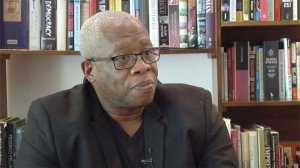Twelve months ago, I had no doubt that the national conference of the African National Congress (ANC) would elect Nkosazana Dlamini-Zuma as president of the ruling party and successor to President Jacob Zuma. Today, a day before the commencement of the conference, I am not so sure. In the past year, the momentum has swung towards Deputy President Cyril Ramaphosa – away from Dlamini-Zuma. Why?
The momentum for Ramaphosa is a momentum for change. To some extent, the momentum is independent from Ramaphosa. In other words, the hunger and appetite for change inside the ANC and in the country has become a critical component of the groundswell of antipathy towards Zuma. So strong has this wave of antipathy become that it is quite possible that the anything- but-Zuma impulse is stronger than the anything-but-Mbeki impulse of a decade ago.
Therefore, by deciding to align herself with the Zuma faction, Dlamini-Zuma consciously empties a vial of poison in her mouth in the hope that her constitution would be strong enough to withstand the damage the poison would do to her image. Because her greatest liability is Zuma, all her opponents have, directly and indirectly, been campaigning against him as if he is part of the presidential race. They want to benefit from Zuma’s image crisis. This focus on Zuma has rendered Dlamini-Zuma invisible, hence the sensitivity to referring to her as ‘Zuma’s ex-wife’.
If she is Zuma’s ex-wife, she does not have an independent identity – both as a woman and a presidential candidate. It is this loss of identity that has reinforced the fear of dynastic politics, especially given the fact that the second part of her double-barrelled surname has become synonymous with rent-seeking. Added to this is the fact that the terms ‘looting’ and ‘State capture’ have become quite evocative in associating the Zuma name with corruption. It is, therefore, not surprising that the majority of provinces have nominated Ramaphosa as the preferred candidate.
Also, her slate is not, or should not be, a winning slate, given the dodgy characters who might occupy key positions in the ANC if Dlamini-Zuma becomes the president of the party. The fact that Mpumalanga Premier David Mabuza and Free State Premier Ace Magashule are on Dlamini-Zuma’s slate as candidates for the positions of ANC deputy president and secretary- general respectively is a problem for Dlamini-Zuma because her slate casts her in a starring role as the candidate for corruption, State capture, patronage, looting and rent-seeking.
Hers is definitely not a winning slate. It is, therefore, not so difficult to imagine a Ramaphosa victory, despite the fact that he has said, and has done nothing, that is remarkable during this presidential race. In fact, it is not very difficult to imagine why Ramaphosa should not be elected ANC president.
First, I do not know what he stands for, because, on key issues, when he is not echoing popular sentiment, he simply chews water. As I have indicated previously, his tactical and strategic ineptitude should have disqualified him from the presidential race. But what may be more damaging in the end is the perception that he is too loyal to the interests of not-white monopoly capital. In the end, though, the wave of antipathy towards Zuma may shape the outcome of the presidential contest.
But Ramaphosa has had three things to his advantage. First, and by default or accidentally, he has become the voice of those in the ANC and in society who want the ANC to revert to its core principles and display the kind of fidelity to revolutionary principles and morality that have become alien to the ANC of Zuma and his disciples. Second, because the imagination is such a powerful thing, there is hope that a Ramaphosa presidency will deliver a new ANC and a prosperous South Africa. Third, he has enlisted the help of credible characters to his cause.
So, who will win?
In the past, the candidate who won support from most provinces has won the race. In this respect, history is on Ramaphosa’s side. History is on Ramaphosa’s side in another respect – when the incumbent became unpopular, this has benefited his opponent. As I have already indicated, Zuma, not Dlamini-Zuma, is Ramaphosa’s opponent.
On the other hand, there is a possibility that Dlamini-Zuma will get the nod from both Mpumalanga and KwaZulu-Natal, the two biggest provinces of the ANC. In the past, the winning candidate won the support of at least two of the biggest provinces. We must also bear in mind that branch nominations, as announced by ANC provinces, may not be an accurate reflection of the balance of support because we need to know how many delegates each branch nomination represents. Therefore, Dlamini-Zuma may still win the race, despite the fact that Ramaphosa has been nominated by more branches.
Edited by: Martin Zhuwakinyu
Creamer Media Senior Deputy Editor
EMAIL THIS ARTICLE SAVE THIS ARTICLE
ARTICLE ENQUIRY
To subscribe email subscriptions@creamermedia.co.za or click here
To advertise email advertising@creamermedia.co.za or click here












